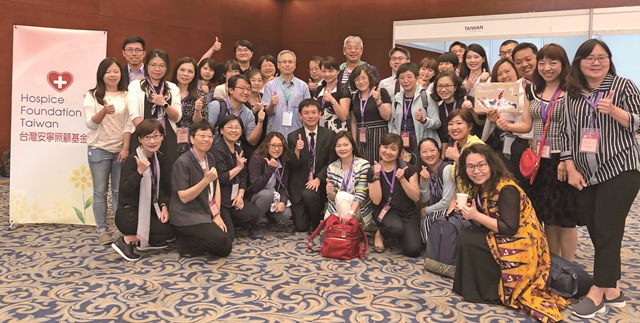
"In fact, palliative care in many countries has been done very well, and each has its own attributes; as a result, each has something that we can learn from," says Wang Yingwei. He further analyzes that, for a national policy or similar systems, Taiwan’s palliative care ranks among the best among Asian countries. "However, at the level of personal care, we still have lots of improvements to make. For example, Japan has many favorable intentions and innovative aspects that we can learn from."
Overall, Wang Yingwei is most impressed by the palliative care of Singapore. During the early stages of Taiwan’s promotion of non-cancer palliative care, Wang Yingwei felt that Singapore was more advanced in this aspect, and invited Singaporean experts to speak in Taiwan. One expert told him that Singapore obtained experiences from the United States when they first started, "But later on, they [US] invited me over to share our experiences regarding palliative care in community development. They learned quickly, and even combined the Advanced Care Planning (ACP), from general to individual needs. Over time, Singapore's palliative care has become complete and also humane."
Adapting Training Methods to Local Conditions for Effective Results
Modesty leads to progress. Due to its early start and comprehensive support in policy and law, Taiwan has developed quite rapidly in enhancing palliative care and has become the model for many countries.
As a member of the Education Committee of the Asia Pacific Hospice Palliative Care Network (APHN), Wang Yingwei represented Taiwan at a APHN meeting in the belief that it is necessary to adapt the education and training of palliative care to local conditions. He says, "I have been to some developing countries before, and found that the developed countries and developing countries have very different ideas about palliative care; their medical environments are completely different as well." Wang Yingwei explains that policies and medical environments vary among countries. "We’ve talked about the use of morphine and painkillers, but there were no similar drugs available locally. There’s no use for them then to come learn from us. For example, some foreign students came to Taiwan for training. We taught them to use computer tomography, but they were correct to point out the fact that only their capital city has such equipment, and the remote areas where they are located do not have these at all. Thus, even if they learned these computer skills, they have no way to apply it in their countries."
"The most important thing in teaching, actually, is to learn rather than teach. Support is what we need to offer each other," continues Wang Yingwei. He then uses a seed illustration, saying: if there is no soil and no water, even if there are seeds readily available, these seeds cannot grow. Therefore, when seed training is required, we should first prepare the soil and water. Additionally, we need to understand the nature of the seeds by assessing what they need and building a supportive network for them. Ultimately, only with such efforts can the training can be effective."
“In the future, the biggest challenge that the Board of Education will face is how to use effective methods to impart experience and achieve the benefits of teaching and learning," concludes Wang Yingwei.
